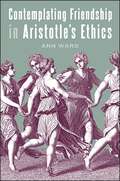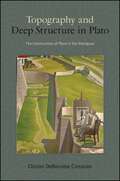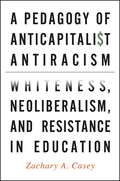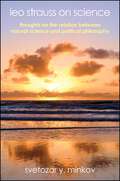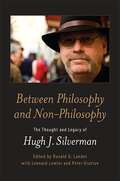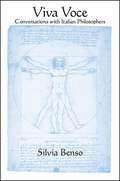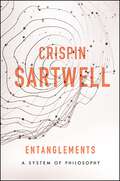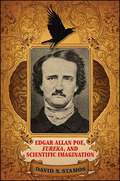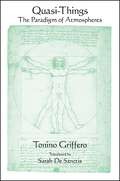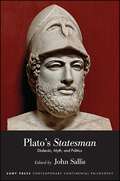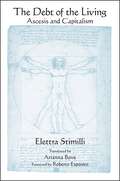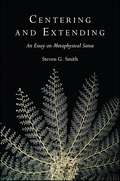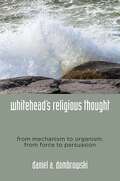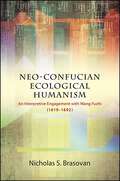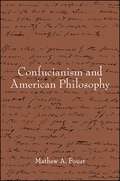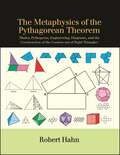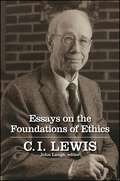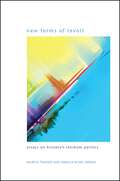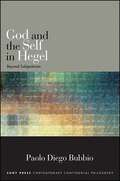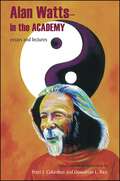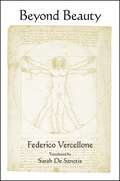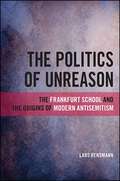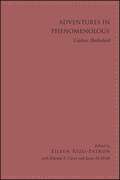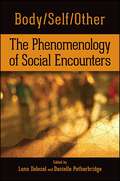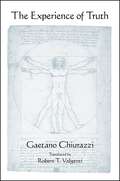- Table View
- List View
Contemplating Friendship in Aristotle's Ethics (SUNY series in Ancient Greek Philosophy)
by Ann WardIn this book, Ann Ward explores Aristotle's Nicomachean Ethics, focusing on the progressive structure of the argument. Aristotle begins by giving an account of moral virtue from the perspective of the moral agent, only to find that the account itself highlights fundamental tensions within the virtues that push the moral agent into the realm of intellectual virtue. However, the existence of an intellectual realm separate from the moral realm can lead to lack of self-restraint. Aristotle, Ward argues, locates political philosophy and the experience of friendship as possible solutions to the problem of lack of self-restraint, since political philosophy thinks about the human things in a universal way, and friendship grounds the pursuit of the good which is happiness understood as contemplation. Ward concludes that Aristotle's philosophy of friendship points to the embodied intellect of timocratic friends and mothers in their activity of mothering as engaging in the highest form of contemplation and thus living the happiest life.
Topography and Deep Structure in Plato: The Construction of Place in the Dialogues (SUNY series in Ancient Greek Philosophy)
by Clinton DeBevoise CorcoranIn this book, Clinton DeBevoise Corcoran examines the use of place in Plato's dialogues. Corcoran argues that spatial representations, such as walls, caves, and roads, as well as the creation of eternal patterns and chaotic images in the particular spaces, times, characterizations, and actions of the dialogues, provide clues to Plato's philosophic project. Throughout the dialogues, the Good serves as an overarching ordering principle for the construction of place and the proper limit of spaces, whether they be here in the world, deep in the underworld, or in the nonspatial ideal realm of the Forms. The Good, since it escapes the limits of space and time, equips Plato with a powerful mythopoetic tool to create settings, frames, and arguments that superimpose different dimensions of reality, allowing worlds to overlap that would otherwise be incommensurable. The Good also serves as a powerful ethical tool for evaluating the order of different spaces. Corcoran explores how Plato uses wrestling and war as metaphors for the mixing of the nonspatial, eternal forms in the world and history, and how he uses spatial images throughout the dialogues to critique Athens's tragic overreach in the Peloponnesian War. Far from merely an incidental backdrop in the dialogues, place etches the tragic intersection of the mortal and the immortal, good and evil, and Athens's past, present, and future.
A Pedagogy of Anticapitalist Antiracism: Whiteness, Neoliberalism, and Resistance in Education
by Zachary A. CaseyWinner of the 2018 Outstanding Book Award presented by the Society of Professors of EducationThrough an analysis of whiteness, capitalism, and teacher education, A Pedagogy of Anticapitalist Antiracism sheds light on the current conditions of public education in the United States. We have created an environment wherein market-based logics of efficiency, lowering costs, and increasing returns have worked to disadvantage those populations most in need of educational opportunities that work to combat poverty. This book traces the history of whiteness in the United States with an explicit emphasis on the ways in which the economic system of capitalism functions to maintain historical practices that function in racist ways. Practitioners and researchers alike will find important insights into the ways that the history of white racial identity and capitalism in the United States impact our present reality in schools. Casey concludes with a discussion of "revolutionary hope" and possibilities for resistance to the barrage of dehumanizing reforms and privatization engulfing much of the contemporary educational landscape.
Leo Strauss on Science: Thoughts on the Relation between Natural Science and Political Philosophy (SUNY series in the Thought and Legacy of Leo Strauss)
by Svetozar Y. MinkovDrawing upon a wealth of previously unpublished archival material, Leo Strauss on Science brings to light the thoughts of Leo Strauss on the problem of science. Introducing us to Strauss's reflections on the meaning and perplexities of the scientific adventure, Svetozar Y. Minkov explores questions such as: Is there a human wisdom independent of science? What is the relation between poetry and mathematics, or between self-knowledge and theoretical physics? And how necessary is it for the human species to exist immutably in order for the classical analysis of human life to be correct? In pursuing these questions, Minkov aims to change the conversation about Strauss, one of the great thinkers of the past century.
Between Philosophy and Non-Philosophy: The Thought and Legacy of Hugh J. Silverman
by Donald A. Landes; Leonard Lawlor; Peter GrattonHugh J. Silverman was an inspiring scholar and teacher, known for his work engaging and shaping phenomenology, hermeneutics, psychoanalysis, structuralism, poststructuralism, and deconstruction. As Professor of Philosophy and Comparative Literary and Cultural Studies at Stony Brook University, State University of New York, Silverman's work was marked by "the between," a concept he developed to think the postmodern in the space between philosophy and non-philosophy. In this volume, leading scholars explore and extend Silverman's philosophical contributions, from reflections on the notions of care, time, and responsibility, to presentations of the practices and possibilities of deconstruction itself. They provide an assessment of Silverman's life and work at the intersection of philosophy, ethics, and politics.
Viva Voce: Conversations with Italian Philosophers (SUNY series in Contemporary Italian Philosophy)
by Silvia BensoThrough conversations with twenty-three leading Italian philosophers representing a variety of scholarly concerns and methodologies, this volume offers an informal overview of the background, breadth, and distinctiveness of contemporary Italian philosophy as a tradition. The conversations begin with general questions addressing issues of provenance, domestic and foreign influences, and lineages. Next, each scholar discusses the main tenets, theoretical originality, and timeliness of their work. The interviews conclude with thoughts about what directions each philosopher sees the discipline heading in the future. Every conversation is a testimony to the differences that characterize each thinker as unique and that invigorate the Italian philosophical landscape as a whole. The individual replies differ widely in tone, focus, and style. What emerges is a broad, deep, lively, and even witty picture of the Italian philosophical landscape in the voices of its protagonists.
Entanglements: A System of Philosophy (SUNY series in American Philosophy and Cultural Thought)
by Crispin SartwellA work of maximally ambitious scope with a foundation in humility, Entanglements sets out a philosophical system of the sort rarely seen over the past century. In a discipline marked by greater and greater specialization and the narrowing of increasingly insular traditions and approaches, Crispin Sartwell has spent his career engaging widely across philosophical topics and texts. Here he brings together his philosophical positions in a unified system that is coherent across the issues and subdisciplines in the field. In addition to presenting his own theories of truth, knowledge, free will, beauty, and the political state, Sartwell's criticisms of other figures and movements provide an overview of the history of philosophy. The project of presenting an overarching philosophical system is a resolutely old-fashioned one, and in undertaking it, Sartwell is not only encapsulating an extraordinarily unique and productive career but also nudging philosophy back to its broader aims of explaining the world and our place in it.
Edgar Allan Poe, Eureka, and Scientific Imagination
by David N. StamosSilver Winner, 2017 Foreword INDIES Book of the Year Awards in the Philosophy categoryIn 1848, almost a year and a half before Edgar Allan Poe died at the age of forty, his book Eureka was published. In it, he weaved together his scientific speculations about the universe with his own literary theory, theology, and philosophy of science. Although Poe himself considered it to be his magnum opus, Eureka has mostly been overlooked or underappreciated, sometimes even to the point of being thought an elaborate hoax. Remarkably, however, in Eureka Poe anticipated at least nine major theories and developments in twentieth-century science, including the Big Bang theory, multiverse theory, and the solution to Olbers' paradox. In this book—the first devoted specifically to Poe's science side—David N. Stamos, a philosopher of science, combines scientific background with analysis of Poe's life and work to highlight the creative and scientific achievements of this text. He examines Poe's literary theory, theology, and intellectual development, and then compares Poe's understanding of science with that of scientists and philosophers from his own time to the present. Next, Stamos pieces together and clarifies Poe's theory of scientific imagination, which he then attempts to update and defend by providing numerous case studies of eureka moments in modern science and by seeking insights from comparative biography and psychology, cognitive science, neuroscience, and evolution.
Quasi-Things: The Paradigm of Atmospheres (SUNY series in Contemporary Italian Philosophy)
by Tonino GrifferoIn this book, Tonino Griffero introduces and analyzes an ontological category he terms "quasi-things." These do not exist fully in the traditional sense as substances or events, yet they powerfully act on us and on our states of mind. He offers an original approach to the study of emotions, regarding them not as inner states of the subject, but as atmospheres, that is as powers poured out into the lived space we inhabit. Griffero first outlines the general and atmospheric characters of quasi-things, and then considers examples such as pain, shame, the gaze, and twilight—which he argues is responsible for penetrating and suggestive moods precisely because of its vagueness. With frequent examples from literature and everyday life, Quasi-Things provides an accessible aesthetic and phenomenological account of feelings based on the paradigm of atmospheres.
Plato's Statesman: Dialectic, Myth, and Politics (SUNY series in Contemporary Continental Philosophy)
by John SallisThe Statesman is among the most widely ranging of Plato's dialogues, bringing together in a single discourse disparate subjects such as politics, mathematics, ontology, dialectic, and myth. The essays in this collection consider these subjects and others, focusing in particular on the dramatic form of the dialogue. They take into account not only what is said but also how it is said, by whom and to whom it is said, and when and where it is said. In this way, the contributors approach the text in a manner that responds to the dialogue itself rather than bringing preconceived questions and scholarly debates to bear on it. The essays are especially attuned to the comedic elements that run through much of the dialogue and that are played out in a way that reveals the subject of the comedy. In the Statesman, these comedies reach their climax when the statesman becomes a participant in a comedy of animals and thereby is revealed in his true nature.
The Debt of the Living: Ascesis and Capitalism (SUNY series in Contemporary Italian Philosophy)
by Elettra StimilliMax Weber's account of the rise of capitalism focused on his concept of a Protestant ethic, valuing diligence in earning and saving money but restraint in spending it. However, such individual restraint is foreign to contemporary understandings of finance, which treat ever-increasing consumption and debt as natural, almost essential, for maintaining the economic cycle of buying and selling.In The Debt of the Living, Elettra Stimilli returns to this idea of restraint as ascesis, by analyzing theological and philosophical understandings of debt drawn from a range of figures, including Saint Paul, Schmitt and Agamben, Benjamin and Marx, Nietzsche and Freud, and Foucault. Central to this analysis is the logic of "profit for profit's sake"—an aspect of Weber's work that Stimilli believes has been given insufficient attention. Following Foucault, she identifies this as the original mechanism of a capitalist dispositif that feeds not on a goal-directed rationality, but on the self-determining character of human agency. Ascesis is fundamental not because it is characterized by renunciation, but because the self-discipline it imposes converts the properly human quality of action without a predetermined goal into a lack, a fault, or a state of guilt: a debt that cannot be settled. Stimilli argues that this lack, which is impossible to fill, should be seen as the basis of the economy of hedonism and consumption that has governed global economies in recent years and as the premise of the current economy of debt.
Centering and Extending: An Essay on Metaphysical Sense
by Steven G. SmithIn Centering and Extending, Steven G. Smith retrieves and refashions some of the best ideas of classical and early modern metaphysics to support insight into the natures of mental and material beings and their relations. Avoiding what he critiques as distortive paths of idealism, materialism, repressive monism, and overly permissive pluralism, Smith builds his framework on centering and extending as universal principles of formation. Identifying the basic consistency of being with these principles in symmetrical partnership enables a naturalist process view that, unlike Whitehead's, does not overbalance toward the subjective and teleological and, unlike Deleuze and Guattari's, does not overbalance toward the material and chaotic. This view supports useful conceptions of mind and matter, form and energy, reason and cause, and a layered world order without relying on a blind concept of supervenience or emergence. It also respects and reinforces a division of roles between metaphysical sense-making and spiritual determinations of meaningfulness.
Whitehead's Religious Thought: From Mechanism to Organism, From Force to Persuasion
by Daniel A. DombrowskiThis original interpretation of the religious thought of Alfred North Whitehead highlights Whitehead's moves from mechanism to organism, and from force to persuasion to offer a third alternative between classical theism and religious skepticism. Daniel A. Dombrowski argues that the move from force to persuasion, in particular, is not only fundamental to Whitehead's own thought and to process thought in general, but is a necessary condition for the continuing existence of civilized life. Following this line of analysis, Dombrowski demonstrates Whitehead's relevance to contemporary work in philosophy of mind, political philosophy, and environmental ethics by placing him in dialogue with six major thinkers: David Ray Griffin, Isabelle Stengers, John Rawls, Charles Hartshorne, Judith Butler, and William Wordsworth.
Neo-Confucian Ecological Humanism: An Interpretive Engagement with Wang Fuzhi (1619-1692) (SUNY series in Chinese Philosophy and Culture)
by Nicholas S. BrasovanIn this novel engagement with Ming Dynasty philosopher Wang Fuzhi (1619–1692), Nicholas S. Brasovan presents Wang's neo-Confucianism as an important theoretical resource for engaging with contemporary ecological humanism. Brasovan coins the term "person-in-the-world" to capture ecological humanism's fundamental premise that humans and nature are inextricably bound together, and argues that Wang's cosmology of energy (qi) gives us a rich conceptual vocabulary for understanding the continuity that exists between persons and the natural world. The book makes a significant contribution to English-language scholarship on Wang Fuzhi and to Chinese intellectual history, with new English translations of classical Chinese, Mandarin, and French texts in Chinese philosophy and culture. This innovative work of comparative philosophy not only presents a systematic and comprehensive interpretation of Wang's thought but also shows its relevance to contemporary discussions in the philosophy of ecology.
Confucianism and American Philosophy (SUNY series in Chinese Philosophy and Culture)
by Mathew A. FoustIn this highly original work, Mathew A. Foust breaks new ground in comparative studies through his exploration of the connections between Confucianism and the American Transcendentalist and Pragmatist movements. In his examination of a broad range of philosophers, including Confucius, Mencius, Xunzi, Ralph Waldo Emerson, Henry David Thoreau, Charles Peirce, William James, and Josiah Royce, Foust traces direct lines of influence from early translations of Confucian texts and brings to light conceptual affinities that have been previously overlooked. Combining resources from both traditions, Confucianism and American Philosophy offers fresh insights into contemporary problems and exemplifies the potential of cross-cultural dialogue in an increasingly pluralistic world.
The Metaphysics of the Pythagorean Theorem: Thales, Pythagoras, Engineering, Diagrams, and the Construction of the Cosmos out of Right Triangles (SUNY series in Ancient Greek Philosophy)
by Robert HahnBringing together geometry and philosophy, this book undertakes a strikingly original study of the origins and significance of the Pythagorean theorem. Thales, whom Aristotle called the first philosopher and who was an older contemporary of Pythagoras, posited the principle of a unity from which all things come, and back into which they return upon dissolution. He held that all appearances are only alterations of this basic unity and there can be no change in the cosmos. Such an account requires some fundamental geometric figure out of which appearances are structured. Robert Hahn argues that Thales came to the conclusion that it was the right triangle: by recombination and repackaging, all alterations can be explained from that figure. This idea is central to what the discovery of the Pythagorean theorem could have meant to Thales and Pythagoras in the sixth century BCE. With more than two hundred illustrations and figures, Hahn provides a series of geometric proofs for this lost narrative, tracing it from Thales to Pythagoras and the Pythagoreans who followed, and then finally to Plato's Timaeus. Uncovering the philosophical motivation behind the discovery of the theorem, Hahn's book will enrich the study of ancient philosophy and mathematics alike.
Essays on the Foundations of Ethics
by C. I. Lewis2018 CHOICE Outstanding Academic TitleC. I. Lewis, one of America's greatest philosophers, was tremendously influential in the fields of logic and epistemology. However, it was to ethics that he devoted the last years of his life. His approach to ethics was not merely as an academic pursuit, but as the deepest and most fundamental challenge of human life, older than philosophy itself: how should one respond to the necessity of action, and cope with the imposed, unforgiving imperatives of self-governance? Drawing from volumes of Lewis's hand-inscribed notes and drafts, John Lange has assembled a version of Lewis's final book, Essays on the Foundations of Ethics, bringing to light his desire to locate and articulate those moral realities which he found to be part of an enlightened common sense, a common sense to be expected in an evolved, self-governing, rational human nature.
New Forms of Revolt: Essays on Kristeva's Intimate Politics (SUNY series in Gender Theory)
by Sarah K. Hansen; Rebecca TuvelOver the last twenty years, French philosopher, psychoanalyst, and novelist Julia Kristeva has explored how global crises threaten people's ability to revolt. In a context of widespread war, deepening poverty, environmental catastrophes, and rising fundamentalisms, she argues that a revival of inner psychic experience is necessary and empowering. "Intimate revolt" has become a central concept in Kristeva's critical repertoire, framing and permeating her understanding of power, meaning, and identity. New Forms of Revolt brings together ten essays on this aspect of Kristeva's work, addressing contemporary social and political issues like immigration and cross-cultural encounters, colonial and postcolonial imaginations, racism and artistic representation, healthcare and social justice, the spectacle of global capitalism, and new media.
God and the Self in Hegel: Beyond Subjectivism (SUNY series in Contemporary Continental Philosophy)
by Paolo Diego BubbioGod and the Self in Hegel proposes a reconstruction of Hegel's conception of God and analyzes the significance of this reading for Hegel's idealistic metaphysics. Paolo Diego Bubbio argues that in Hegel's view, subjectivism—the tenet that there is no underlying "true" reality that exists independently of the activity of the cognitive agent—can be avoided, and content can be restored to religion, only to the extent that God is understood in God's relation to human beings, and human beings are understood in their relation to God. Focusing on traditional problems in theology and the philosophy of religion, such as the ontological argument for the existence of God, the Trinity, and the "death of God," Bubbio shows the relevance of Hegel's view of religion and God for his broader philosophical strategy. In this account, as a response to the fundamental Kantian challenge of how to conceive the mind-world relation without setting mind over and against the world, Hegel has found a way of overcoming subjectivism in both philosophy and religion.
Alan Watts - In the Academy: Essays and Lectures (SUNY series in Transpersonal and Humanistic Psychology)
by Alan WattsGold Winner, 2017 Foreword INDIES Book of the Year Awards in the Philosophy categoryTo commemorate the 2015 centenary of the birth of Alan Watts (1915–1973), Peter J. Columbus and Donadrian L. Rice have assembled a much-needed collection of Watts's scholarly essays and lectures. Compiled from professional journals, monographs, scholarly books, conferences, and symposia proceedings, the volume sheds valuable light on the developmental arc of Watts's thinking about language and mysticism, Buddhism and Zen, Christianity, comparative religion, psychedelics, and psychology and psychotherapy. This definitive collection challenges Watts's reputation as a "popularizer" or "philosophical entertainer," revealing his concerns to be much more expansive and transdisciplinary than is suggested by the parochial "Zen Buddhist" label commonly affixed to his writings. The editors' authoritative introduction elucidates contemporary perspectives on Watts's life and work, and supports a bold rethinking of his contributions to psychology, philosophy, and religion.
Beyond Beauty (SUNY series in Contemporary Italian Philosophy)
by Federico VercelloneThe American abstract expressionist painter Barnett Newman famously declared in 1948 that the impulse of modern art is to destroy beauty. Not long after that, Andy Warhol was reconciling the world of art with the world of everyday life, painting soup cans and soda bottles. In this book, Federico Vercellone provides an account of the decline of beauty as a Platonic ideal from early German Romanticism to the twentieth century. He traces this intellectual trajectory from Goethe, Dilthey, and Nietzsche, through modernism and the avant-garde move ment, to the work of Adorno and Heidegger. Rather than the death or destruction of beauty, Vercellone argues instead that beauty in the twentieth century came back to live in reality and everyday life. He suggests this is a new edition of the classical ideal rather than an abandonment of it, and further makes the case for the ecological significance of this orientation and outlook.
The Politics of Unreason: The Frankfurt School and the Origins of Modern Antisemitism (SUNY series, Philosophy and Race)
by Lars RensmannAlthough the Frankfurt School represents one of the most influential intellectual traditions of the twentieth century, its multifaceted work on modern antisemitism has so far largely been neglected. The Politics of Unreason fills this gap, providing the first systematic study of the Frankfurt School's philosophical, psychological, political, and social research and theorizing on the problem of antisemitism. Examining the full range of these critical theorists' contributions, from major studies and prominent essays to seemingly marginal pieces and aphorisms, Lars Rensmann reconstructs how the Frankfurt School, faced with the catastrophe of the genocide against the European Jews, explains forms and causes of anti-Jewish politics of hate. The book also pays special attention to research on coded and "secondary" antisemitism after the Holocaust, and how resentments are politically mobilized under conditions of democracy. By revisiting and rereading the Frankfurt School's original work, this book challenges several misperceptions about critical theory's research, making the case that it provides an important source to better understand the social origins and politics of antisemitism, racism, and hate speech in the modern world.
Adventures in Phenomenology: Gaston Bachelard (SUNY series in Contemporary French Thought)
by Eileen Rizo-Patron; Edward S. Casey; Jason M. WirthLike Schelling before him and Deleuze and Guattari after him, Gaston Bachelard made major philosophical contributions to the advancement of science and the arts. In addition to being a mathematician and epistemologist whose influential work in the philosophy of science is still being absorbed, Bachelard was also one of the most innovative thinkers on poetic creativity and its ethical implications. His approaches to literature and the arts by way of elemental reverie awakened long-buried modes of thinking that have inspired literary critics, depth psychologists, poets, and artists alike. Bachelard's extraordinary body of work, unduly neglected by the English-language reception of continental philosophy in recent decades, exhibits a capacity to speak to the full complexity and wider reaches of human thinking. The essays in this volume analyze Bachelard as a phenomenological thinker and situate his thought within the Western tradition. Considering his work alongside that of Schelling, Husserl, Bergson, Buber, Heidegger, Merleau-Ponty, Gadamer, Deleuze, and Nancy, this collection highlights some of Bachelard's most provocative proposals on questions of ontology, hermeneutics, ethics, environmental politics, spirituality, and the possibilities they offer for productive transformations of self and world.
Body/Self/Other: The Phenomenology of Social Encounters
by Luna Dolezal; Danielle PetherbridgeBody/Self/Other brings together a variety of phenomenological perspectives to examine the complexity of social encounters across a range of social, political, and ethical issues. It investigates the materiality of social encounters and the habitual attitudes that structure lived experience. In particular, the contributors examine how constructions of race, gender, sexuality, criminality, and medicalized forms of subjectivity affect perception and social interaction. Grounded in practical, everyday experiences, this book provides a theoretical framework that considers the extent to which fundamental ethical obligations arise from the fact of individuals' intercorporeality and sociality.
The Experience of Truth (SUNY series in Contemporary Italian Philosophy)
by Gaetano ChiurazziWhat does it mean to say that something is true? In this book Gaetano Chiurazzi argues that when we say that something is true, we do not say something merely about a state of affairs, but also about ourselves. Truth is not just the fact of "what is out there," but a mode of existence that shapes and transforms human understanding. Supported by an original reading of Aristotle's theory of judgment and Heidegger's hermeneutical theory of truth, Chiurazzi also engages the work of Nietzsche, Gadamer, Putnam, and Rorty to challenge the rising tide of theories that dismiss the importance of human experience to the idea of truth.
